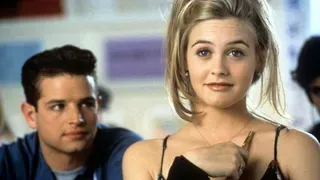August 16, 2024
Review: Fully Restored 'Caligula: The Ultimate Cut' is Literally Nothing You've Seen Before
Kilian Melloy READ TIME: 4 MIN.
Think you've seen "Caligula?" Unless you were at Cannes last year to see this new "Ultimate Cut," don't be so sure.
A from-the-ground-up reconstruction of the infamous 1979 Bob Guccione-financed film, assembled from more than 90 hours of film (much of it long thought to have been lost), the "Ultimate Cut" is three hours of eye-popping footage never seen until now thanks to the use of alternate takes and cut scenes. The film is therefore both old and new, and it feels that way, just as it feels both profound and profane, titanic and trivial, and generally confounding. The "Ultimate Cut" is set to sweep into cinemas in a gorgeous 4K on Aug. 16.
"Caligula" stars British movie royalty Malcolm McDowell and Helen Mirren in fully committed (and sometimes fully nude) performances, as well as featuring John Gielgud, Peter O'Toole, and other major stars from its time. Gore Vidal wrote the screenplay ... or, a version of it anyway; he's credited here as having authored a screenplay that this film is based on, whatever that means. Italian filmmaker Tinto Brass helmed the production, but was dismissed before the editing phase when Guccione (the publisher of Penthouse magazine) decided to have some explicit new material filmed that would goose up the movie's sexual content.
There's nothing especially explicit in this reconstruction of the film by art historian and filmmaker Thomas Negovan, even though many scenes unfold against a backdrop of orgies, sex parties, and casually carnal displays. The fantastical array of costumes (by Danilo Donati) are sheer, with bare flesh peeking through, underneath, and around – when, that is, the cast are wearing clothing at all.
But the film's true hallmark is its splendid scale, with a set design (no credit given, though Donati is also listed as Art Director) that justifies every bit of the film's widescreen format. The 4K restoration ensures that the visuals, including Silvano Ippoliti's cinematography, are stunning. (Just try not to gawk at the tracking shots of the larger-than-life, elaborately decorated sets.)
The story is one of unchecked power and equally unchecked corruption. After ascending to the position of Emperor of Rome, Caligula (McDowell) abuses the power of his office, coerces, dominates, and humiliates Rome's lawmakers, panders to the people, and grows increasingly erratic and detached from reality. (If nothing else, the movie is a solid reminder that our strange times are hardly novel to history.) A love affair with his own sister, Drusilla (Teresa Ann Savoy), is rationalized by his adherence to a cult devoted to Egyptian gods. Still, to placate tradition, he marries suitably, to noblewoman Caesonia (Mirren). But dangers lurk within Caligula's own palace, as an imperial version of the "deep state" plots his downfall.
All the pieces are there for what should be a gripping epic, one that excites the intellect as well as more primitive emotions. Where the film falters, however, is in a combination of that vast scale being extended to the acting (overblown, with some significant, standout exceptions; thank McDowell for these moments) and to the amount of dead air afforded many of the scenes. It's no wonder this movie is three hours long, and it feels longer. With some judicious editing it could easily have been trimmed to a more reasonable running time, and its emotional force amplified.
If the intrigue and craziness seem inexplicably dull, the "sexy" stuff is stone-cold dead, lacking all eros. Soldiers line the walls clad in nothing but a few scraps of armor, and supernumeraries make a half-hearted show, at one point, of providing the main ingredient for a semen bath; sexual displays rollick on the margins of weddings and an official brothel, established to replenish the state coffers, serves the purpose of emasculating the Roman senate by employing their wives.
There's no sizzle to any of this. The carnal trimmings are gratuitous, laughable, or downright boring. The only time the sexual elements seem to work is when they illustrate the emperor's depravity, emphasizing how Caligula demeaned those around him simply because he could. (A wedding-set rape scene in which the emperor violates both the bride and the groom is particularly vile.)
The movie was a huge hit, and a huge scandal, when it was first released in 1979; those two things are surely not unrelated. "Caligula" remains faithful to the recorded actions of the historical figure (he really did name his horse to the senate), and there's no overlooking the brutal scorn that both film and titular character pour on Rome's spineless ruling class. A nasty spectacle of public execution, carried out with what seems to be an enormous mowing machine, is only one example of how violence counterbalances sex in this film, which could be read as a withering comment on popular entertainment or, equally, an effort to play to (and cash in on) the tastes of the vulgate.
But is this a film with much in the way of social or artistic value? This new edition is authoritative in terms of what the movie is, but is this what the film should have been?
Like it or loathe it, look for this new restoration to put "Caligula" right back in the middle of a cultural conversation about politics, power, sex, and the cultural supremacy of the movies.
"Caligula: the Ultimate Cut" premieres in theaters Aug. 16.
Kilian Melloy serves as EDGE Media Network's Associate Arts Editor and Staff Contributor. His professional memberships include the National Lesbian & Gay Journalists Association, the Boston Online Film Critics Association, The Gay and Lesbian Entertainment Critics Association, and the Boston Theater Critics Association's Elliot Norton Awards Committee.







